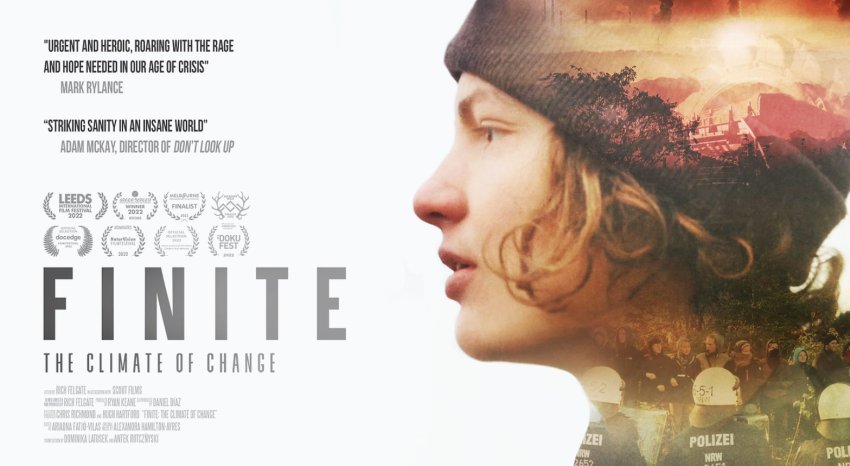
Finite: The Climate of Change
Directed by Rich Felgate
Screening as part of the Melbourne International Documentary Festival in July and the Brisbane International Film Festival in October.
It’s 2023. The world has warmed by 1.2°C already and global emissions are still rising. And yet, even in countries that claim leadership on climate change, mad decisions continue to be made. Britain approved a new coal mine at the end of last year. Germany has failed to fix its coal dependency. The drive for profit prevails.
What do you do in response to this kind of madness? How far will you go to stand up to it?
These are the sorts of questions raised in the new documentary Finite: The Climate of Change. It focuses on coal, the biggest source of emissions, and the activists trying to stop it.
This is a film about direct action. It moves between coal protests in the north of England, camped in the way of a new mine in County Durham, and activists perched in the trees of Hambach forest in Germany, site of some recent high-profile protests. That makes it an inside look at two iconic protest sites, and a very timely film.
With a brief introduction that takes in images of fire, flood and displacement, the film quickly locates itself among real people and places. In England, residents of a village on the edge of a potential new mine try to raise awareness, petition the council and generally thwart the mining company’s efforts to start work.
In Germany, we see the kind of threat they want to avoid — thousand-year-old villages being bulldozed to make way for RWE’s coal mining. Activists take us to see “the biggest hole in Europe”, and to the trees at the edge of it. A whole community lives in a network of 70 treehouses, trying to make things as difficult as possible for the loggers that move ahead of the excavators.
The protesters talk about their motivations to protect the forest, prevent climate change and work for justice. One activist describes how jobs for Germans are valued more highly than the lives of those in the Global South. There are small details of domestic living in extraordinary circumstances, as people make dinner in the treetops or pitch their tents in the snow. It contrasts with the spectacle of coal’s desctruction — the felling of trees, the demolition of a church, the vast machinery that chews up entire landscapes.
The protesters put themselves in the way of all this, facing off against bailiffs and their eviction orders and lying in the path of trucks. In both countries, the police are called on to protect coal interests. The viewer is often in the thick of the resulting action, between lines of occupiers and oncoming riot police. Batons are wielded and pepper is sprayed. Arms are twisted and people are carried away. There are nerve-racking moments, a hovering threat of violence, but what else can you do?
“Direct action is when you take control of the situation yourself,” says a British activist called Thomas. “When you recognise that you can no longer rely on our democratic structures to fairly represent what the people want … We have to push against these systems to change them.”
The strength of the film is its access, no doubt helped by the fact that director Rich Felgate has been a climate activist himself. He is trusted enough to get his cameras into tunnels and lock-ons, accompanying actions and infiltrations. This is not without cost to the filmmakers too, a point reinforced starkly towards the end of the film.
All told, it’s a portrait of immense bravery in the face of a suicidal industry and the state power that blindly protects it. Like protest movements of the past, the heroism might not be recognised until later. But that time will come. Coal will come to a slow and juddering halt. And we will owe our thanks to the people who were prepared to put their lives and their freedom on the line to stop it.
[Abridged from The Earthbound Report. Finite will be screened in Australia at the Melbourne International Documentary Festival in July and the Brisbane International Film Festival in October.]